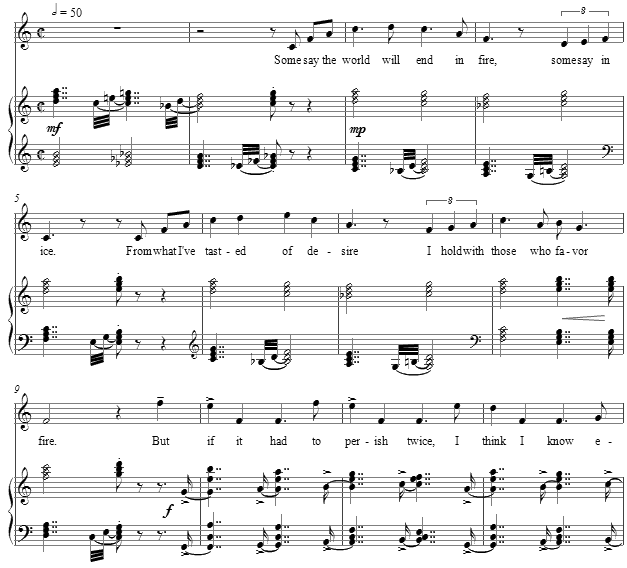Music and Texts of GARY BACHLUND
Vocal Music | Piano | Organ | Chamber Music | Orchestral | Articles and Commentary | Poems and Stories | Miscellany | FAQs
Fire and Ice - (2005)
Robert Frost
for high, medium or low voice and piano
Some say the world will end in fire,
Some say in ice.
From what I’ve tasted of desire
I hold with those who favor fire.
But if it had to perish twice,
I think I know enough of hate
To know that for destruction ice
Is also great
And would suffice.[ 2 pages, circa 1' 20" ]
Robert Frost
From Harper’s Magazine, December 1920, and included in his anthologies, this popular poem speaks to the modern dialogue of the world's end through natural and supernatural catastrophes. In my early years in college, the enthusiasm -- it if must be called anything -- was to forecast the world's end through scientific means. Scientific American, a magazine I no longer trust for accurate reporting, carried their catastrophic "end time" message of global cooling, whereas only thirty years later they report and politic for the opposite scenario. Fire or ice? Both, were one to survey only thirty and more years of "popular" science reporting.
The very human penchant for predicting our world's end has been an exercise spanning millennia, in which those who predict are often also those who propose supposed solutions which not surprisingly benefit those who propose the solutions. Religious leaders of many sorts have convinced their followers of actions necessary to that "end time," and the modern seemingly scientific jargon seems more of the same. Given that adaptability is one hallmark of life, from the Darwinian perspective, it is more likely that we will adapt to whatever changes we will next experiences, more than control the weather which is the modern -- and hence age old -- doctrine.
Frost rightly notes in his wondrous few lines "desire" and "hate" are hallmarks of mankind's continuing generations, and that either "end" to the life, the world, and the cosmos will "suffice." Those infected with the great, world religion of "I am right and you are wrong" will argue that one or the other is our end, while that "end" comes to us all, irrespective of either choice.
The triadic polytonality suggests the discussion between "fire" and "ice," with each fitting into a larger scheme of things. The first two bars indicate the differences of opinion as the lower triads descend by half-steps over the upper triads' movement in whole steps. The setting ends with a restatement of the poem's beginning and then its title, "fire and ice."
The score to Fire and Ice is available as a free PDF download, though any major commercial performance or recording of the work is prohibited without prior arrangement with the composer. The violin part is attached at the end of the file, as a separate score. Click on the graphic below for a piano-vocal score.

